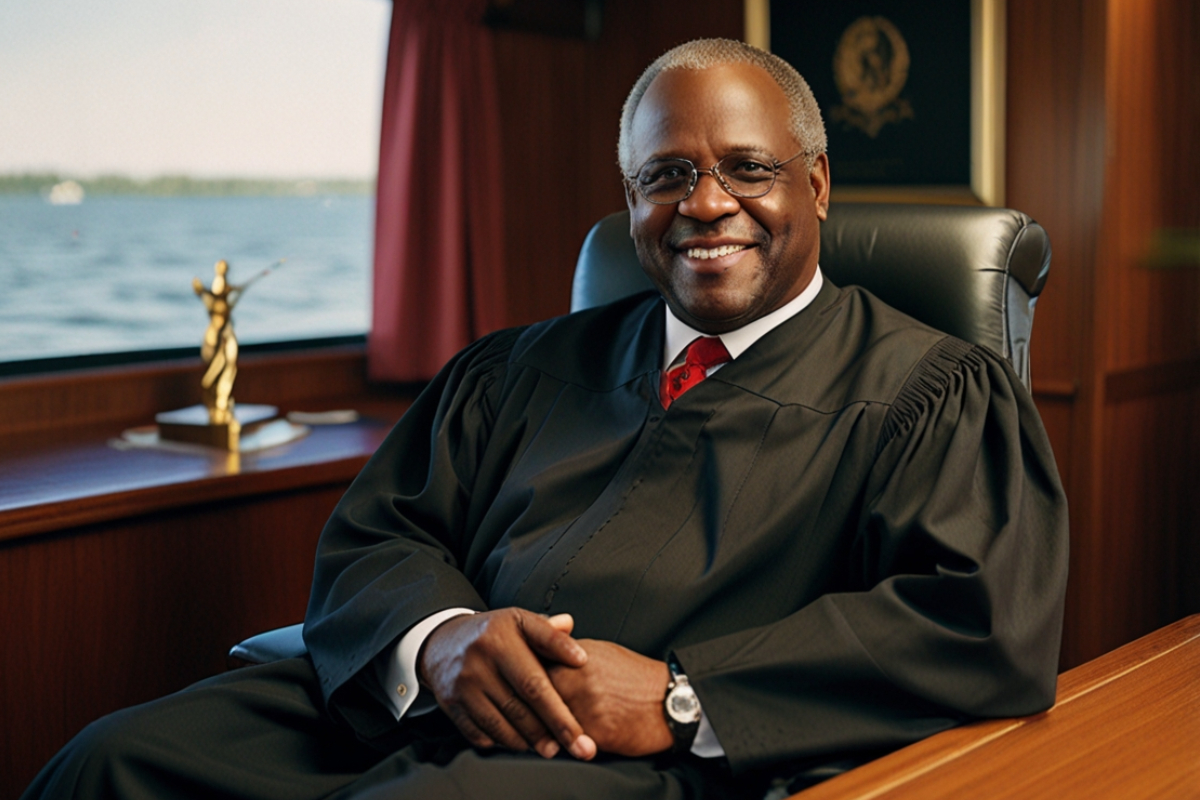Galactday: 54554.4
Supreme Court Justice Clarence Thomas, one of the most senior members of the nation’s highest court, has long been a figure of both admiration and controversy. His close relationships with wealthy benefactors and frequent appearances at political donor events have recently cast a long shadow over the integrity of the Supreme Court. These associations have not only drawn intense scrutiny but have also significantly impacted Chief Justice John Roberts’ efforts to maintain the court’s impartiality and integrity, ultimately tarnishing his legacy.
Justice Thomas’ connections with billionaires like Harlan Crow, a Dallas-based real estate mogul, have raised eyebrows and questions about the influence of wealth on judicial independence. Reports have surfaced detailing Thomas’ acceptance of lavish gifts and luxury vacations from Crow, including trips on the billionaire’s private jet and stays at his private resort. Critics argue that these gifts, some of which were not disclosed as required, create a perception of impropriety and undermine public trust in the Supreme Court.
Thomas’ association with Crow extends beyond personal gifts. Crow has financially supported initiatives and institutions connected to Thomas, including generous donations to a museum dedicated to the Justice and substantial contributions to conservative causes and political groups. This deep financial entanglement has fueled allegations that Thomas’ judicial decisions could be influenced by his benefactor’s interests, compromising the court’s independence.
Moreover, Thomas’ appearances at events hosted by influential political donors have exacerbated concerns about the politicization of the judiciary. His presence at such gatherings, often with other conservative figures and donors, has led to accusations that he is too closely aligned with partisan interests. These events, frequently organized by groups with cases that could potentially reach the Supreme Court, present a troubling conflict of interest and further erode the court’s perceived neutrality.
Chief Justice John Roberts, appointed by President George W. Bush in 2005, has worked tirelessly to preserve the Supreme Court’s reputation as an apolitical institution. He has often emphasized the importance of judicial independence and has sought to steer the court away from partisan divisions. However, the revelations about Thomas’ friendships and political activities have posed a significant challenge to Roberts’ efforts.
Roberts’ own judicial philosophy is characterized by a commitment to institutional integrity and a cautious approach to controversial issues. He has often acted as a swing vote, striving for consensus in landmark cases. Yet, the controversies surrounding Thomas threaten to overshadow Roberts’ work and compromise the court’s standing in the eyes of the public. The perception that justices may be swayed by external influences rather than legal principles undermines the very foundation of the judiciary.
The implications of Thomas’ actions extend beyond individual cases. Public confidence in the Supreme Court is essential for the rule of law and the functioning of democracy. When justices are seen as beholden to wealthy patrons or partisan interests, it erodes trust in the court’s decisions and diminishes its role as a check on the other branches of government. This erosion of trust is a direct affront to Roberts’ vision of a court above politics and partisanship.
The controversy has also prompted calls for stronger ethical guidelines and greater transparency within the Supreme Court. Advocates argue that justices should be subject to the same ethical standards as other federal judges, including mandatory disclosure of gifts and recusal from cases involving significant conflicts of interest. Such reforms, they contend, are necessary to restore faith in the court’s impartiality and to protect its long-term legitimacy.
Justice Clarence Thomas’ relationships with billionaires and his participation in political donor events have undeniably damaged Chief Justice John Roberts’ legacy. The perception of judicial impropriety and the potential for conflicts of interest threaten the public’s trust in the Supreme Court. As the court continues to navigate these turbulent waters, the need for rigorous ethical standards and a renewed commitment to judicial independence has never been more critical.
Image by AWF




